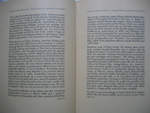|
Thus, after his travels and studies of the sixties and much manual work, so to speak, in this domain, translations and the like, to earn a living, he applied the same intensity of work to revolutionary purposes, the organisation of secret propagandist travels, meeting, lectures and printing, and to secret lectures of his own in the guise of a working man. His interest was always a thorough one, he went to the bottom of things and did the real work, small or large, as required, from a revolutionary lecture to drawing up a plan for the reorganisation of the movement all over Russia.
When the lives and ideas of many anarchist thinkers and actors will be more fully known and examined, it will be a charming task for a keen reasoned and psychologist to point out all the nuances and shades of their various conceptions of Anarchism— for Anarchism is happily quite the opposite of a cast iron theory— and then Bakunin, Kropotkin, James Guillaume, Cafiero, Malatesta and others will meet before the eyes of the reader. It will be particularly interesting to compare the Anarchism of Kropotkin and that of Elisée Reclus, who closely co-operated, who were intimate friends, and yet who seem, to me at least, to possess great differences as well as remarkable affinities. To me Kropotkin's Anarchism seems harder, less tolerant, more disposed to be practical; that of Reclus seems to be wider, wonderfully tolerant, uncompromising as well, based on a more humanitarian basis. There is room for both and more, and if Kropotkin's Anarchism is more of his time and parts of it may vanish with himself, that of Reclus seems more lasting to me; the time to recognise it fully has not yet arrived, but is sure to come.
My personal recollection of him dates from the Commune meeting held in London in March 1888 and a series of lectures given by Kropotkin and other members of the Freedom group in that year, some of them at the Socialist League offices in Farringdon Road. But at that time no further cooperation ensued between the League where revolutionary socialism predominated and the Group which was strictly anarchist communist and it was not until the commonweal Group, the final outcome of the Socialist League, had been broken up by persecutions in 1894, and "Freedom" also was voluntarily interrupted for some months in 1894-95, that the rest of the Commonweal Group and the Freedom Group amalgamated and "Freedom" was resuscitated in May, 1895, to be published without a break from that time until to-day.
Somehow none of these events, the stirring times of the early nineties, brought Kropotkin into a contact with the English movement so close as that which existed— as I heard from the old comrades— between himself and the movement in the Jura townships and at Geneva. The literary work for his living (auxiliary geographical work, etc.), and his health impaired by Russian and French prison life, also the many calls on his literary help, correspondence, etc., required a certain retirement, besides periods of strained library work; and he always dwelt at a considerable distance from the centre, at Harrow, Action, Bromley (Kent), Muswell Hill, and finally, when his health demanded it, at Brighton, and only passed an odd week or so in London now and then for library researches. As he gave all his time to work, study, correspondence, and visitors, he could not possibly have done more; and if his contact with the London movement had been more frequent other parts of his work which appeal to a larger public must have been curtailed.
He had so very many things in hand which led to studies, which, like all serious studies, never come to an end. Thus
|

|